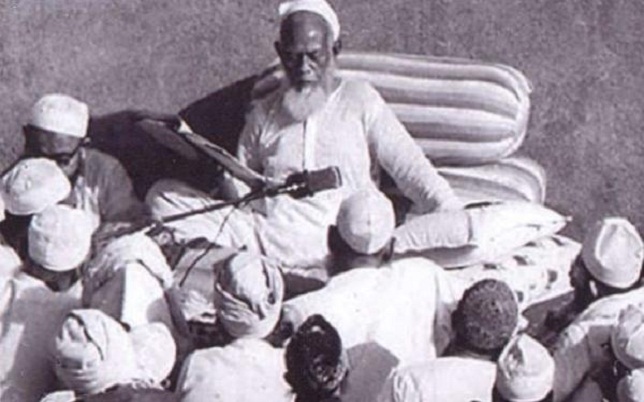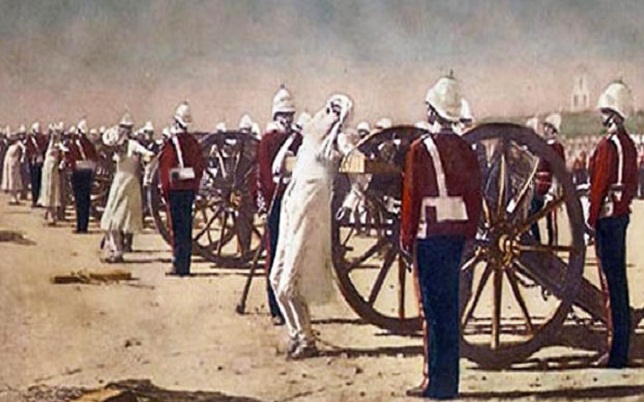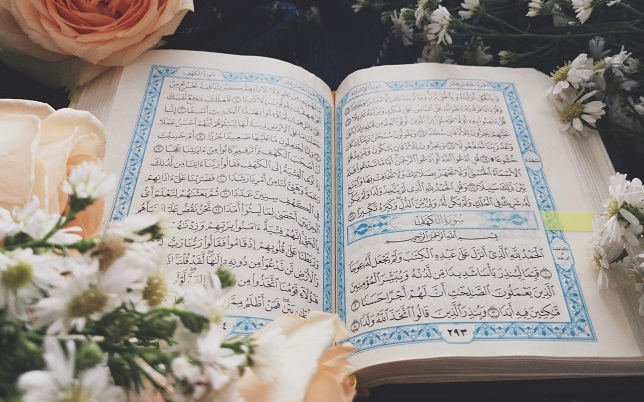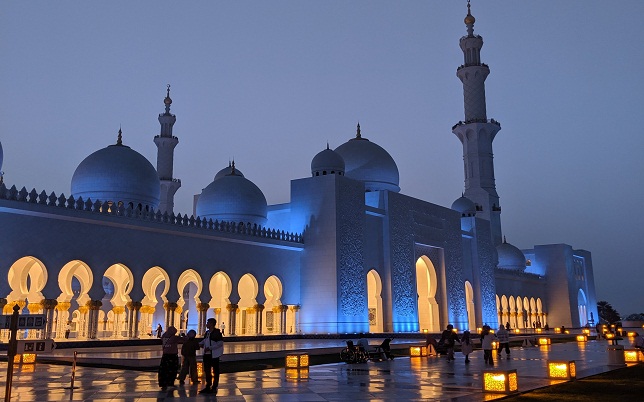It is amazing that although the chief Sufistic Orders had their origins outside India, sufism attained its greatest success in India. This was due partly to the circumstances of history and partly to the inherent Indian character and temperament. There branched forth from these Orders such fraternities in India which themselves grew into permanent orders and recognized schools of Islamic mysticism.
Contents
Major Sufi Orders of the World
The four well-known Sufistic Orders are:
- The Qadiriya Sufi Order
- The Chishtiya Sufi Order
- The Naqshbandiya Sufi Order
- The Suhrawardiya Sufi Order
Sufi Orders from India
Apart from these four major Sufi Orders, there are other Sufi Orders and fraternities that are essentially Indian and are attributed solely to men who were born in India and returned to its dust, for instance;
- The Madariya Sufi Order
- The Qalandriya Sufi Order
- The Shattariya Sufi Order
- The Mujaddidiya Sufi
Great Sufi Saints of India in Recent Past
India has been the standard-bearer of Tasawwuf (Islamic mysticism), spiritual evolution and self-reform since the 17th Century. During that period of time that an infinite number of persons benefited spiritually from Sheikh Ahmad Sirhindi and his illustrious son and successor, Khwaja Mohammad Masoom. The deputies of the latter were found in several foreign countries like Iran, Afghanistan and Turkestan.
Similarly, devoted followers from Turkey, Baghdad, Syria, Samarkand, Bukhara, Egypt, China and Ethiopia were drawn to the Khanqahs (Spiritual seminaries) of the 19th Century saint of the Mujaddidiya Order, Shah Ghulam Ali Dehlavi. The Mujaddidiya Order was popularized in Iraq, Syria, Kurdistan and Turkey by Sheikh Ghulam Ali’s deputy, Maulana Khalid Rumi, where it still endures.
Then, at the beginning of the 20th century, it was the turn of Haji Imdadullah Muhajir Makki to rise to dizzy heights of fame. He was popularly known in the Islamic World as the ‘Spiritual Guide of the Arabs and the Non-Arabs’. Innumerable Arabs and non-Arab Hajj pilgrims who came to Arabia, availed themselves of priceless spiritual guidance of Haji Imdadullah during his stay in that country.
Even in the contemporary Muslim World, it is India which is keeping the spirit of God-seeking alive. An uninterrupted chain of earnest and exalted men of God has enabled India to maintain its distinction as the universal centre of spiritual and Sufistic endeavour. It is now the sole refuge in the world of the votaries of Sufism.
Muslim Period of India Arrived with Great Sufis

The Muslim era in Indian History was in fact heralded by the Sufi divines, particularly by Khwaja Moinuddin Ajmeri who also laid the foundations here of the Chistiya Order of Islamic mysticism. From the earliest days the rich competed with the poor and the high with the low to honour these elevated self-denying men of God till the whole sub-continent was lit with a thick cluster of spiritual luminaries and their religious establishments.
Apart from the more important towns, there was hardly a Muslim village which was left without a moral teacher or a spiritual guide. We present the following records of enthusiastic devotion of the people of India to the Sufi saints and their overwhelming response to religious emotions:
Popularity of Sufi Saint Syed Adam Bannuri
The daily average of votaries staying at the Khanqah (Spritual Seminary) of Syed Adam Bannuri (d. 1643) was one thousand. They took their meals at the Khanqah. A great throng of men, including hundreds of theological doctors, followed the saint wherever he went.
It is stated in Tazkira-i-Adamiya that 10,000 persons formed his entourage during the visit to Lahore in 1642. Seeing the phenomenal popularity of Syed Bannuri, Emperor Shahjehan became so apprehensive that he thought of a plan to send him out of India. So Shahjahan sent to him a large sum of money and then suggested that as the possession of sufficient money makes the Haj pilgrimage obligatory for a Muslim, therefore Syed Bannuri should not waste any time in proceeding to the Haj to discharge his duty. The saint thereupon migrated from India.
Popularity of Sufi Saint Khwaja Mohammad Masoom
Hazrat Mujaddid’s celebrated son and spiritual deputy, Khwaja Mohammad Masoom (d. 1668) had as many as 9,00,000 disciples who did the Bai’at (here it means the oath taken by a person at the time of becoming disciple the of a saint.) and repentance at his hand. Among the huge number of his disciples, 7000 rose to become his Khalifas (Spiritual Deputies).
It is recorded about Shah Ghulam Ali in Sir Syed Ahmad Khan’s Aasar-us-Sanadeed that “not less than 500 destitute persons used to live in his Khanqah all of whom were fed and clothed by him.”
Popularity of Sufi Saint Syed Ahmad Shaheed
Unprecedented scenes of popular enthusiasm were witnessed during the missionary tours of the famous divine and spiritual leader of the 19th century, Syed Ahmad Shaheed, during his journey to Calcutta while on the way to Arabia for the Haj.
In many of the towns that fell on Syed Shaheed’s route few persons were left who did not offer bai’at and repentance at his hand. At Allahabad, Mirzapur, Varanasi, Ghazipur, Azimabad, (Patna) and Calcutta specially, his disciples must have run into lakhs.
The limit was that at Varanasi the indoor patients of the Sadar Hospital sent to him a petition begging that since they were unable to move out he might condescend to visit them in the hospital so that they could take the bai’at. About a thousand persons became his disciples every day during his two months stay at Calcutta.
From morning till late at night a stream of men and women would pour in where he was staying. There was hardly any time left for Syed Shaheed to attend to his personal needs.
When it became impossible to administer the vow to everyone individually, it was arranged for the aspirants to gather in a large house where Syed Saheb went and initiated them into the fold. Seven or eight turbans were unrolled on the ground when he went there and the aspirants were told to hold them at different places, while one end of them was held by Syed Saheb himself.
Syed Ahmad Shaheed then taught them the fundamentals of the Faith and read out the oath in a loud voice like Azaan (muslim call to prayer) which they repeated, and thus the ritual was completed. This was done seventeen or eighteen times each day.
Fundamental Teachings of Sufism

The virtuous Sufis would call upon those taking bai’at (the oath taken by a person at the time of becoming disciple the of a saint) at their hands to:
- Offer earnest repentance for their sins.
- Make a solemn affirmation of loyalty and obedience to God and the Prophet.
- Refrain from licentiousness and self-indulgence, injustice, oppression and violation of the rights of others.
These pious teachers addressed themselves to the moral elevation of their disciples by
- Prescribing measures for the eradication of vices like vanity, malice, jealousy and lust for wealth and power.
- They urged their disciples to remember God and to do well to His creatures and practice self-abnegation and contentment.
Besides the bai’at which symbolized forging of a special link between the guide and the disciple, the Sufi teachers also exhorted and gave good counsel to whoever came to them and strove to awaken in their hearts the love for the Divine and the ambition to seek His pleasure and to strive with all his might for self-correction and inner reform.
Moral and Social Reforms by Great Sufi Saints in India
Illustrative of the powerful, inspiring and morally regenerating influence exercised on the society by the Sufi leaders through their tremendous sincerity, moral excellence, preaching and instruction is the following extract from the renowned historian, Ziauddin Barni, depicting the social conditions prevailing in India during the reign of Alauddin Khilji:
“The leading Sufi saints at the time of Alauddin Khilji were Sheikh-ul-Islam Nizamuddin, Sheikh-ul-Islam Alauddin and Sheikh-ul-Islam Ruknuddin. A world received enlightenment from them and took the bai’at at their hands.
Sinners were inspired by them to repent for their sins and thousands of evil-doers and habitual defaulters of Namaz (Daily 5 times Muslim Prayer) abandoned their evil ways and became devout worshipers; a strong fervour was created among them for religious deeds and their repentance attained perfection.
The obligatory duties of worship and Divine ordinances in the other spheres of life began to be observed as a matter of course. Excessive attachment to worldly desires and aspirations, which lies at the root of most of the evils, got reduced under the force of the high morality, asceticism and profound self-denial of these spiritual masters………………
People grew truthful as a result of their blessings; they became honest in the management of worldly affairs and were fired by the ambition to improve and evolve their inner selves due to the inspirational influence exercised by the laudable moral conduct, abstinence and spirituality of the Sufi leaders……..”
The historian goes on to describe the moral reforms brought by great Sufis in Indian society:
“In the last years of Sultan Alauddin’s rule the general moral level had improved so much that a majority of the people abstained from drink, adultery, gambling and other social and moral perversions. The major sins were shunned as equivalents of infidelity. Muslims refrained from open usury and hoarding for fear of each other’s censure. Adulteration, deceit and under-weighing were eliminated from the market.”1
It is manifestly impossible to give a coherent, historical picture of the reformation brought about in public morals by the Sufi divines in few lines. It is enough to know here that the Sufi saints have made an enormous contribution towards the evolution of a healthy, conscientious environment in India which is the nation’s greatest asset and which has provided it with worthy leaders and redeemers at every critical turn of history.
Incredible Impact of Syed Ahmad Shaheed on India
Leaving aside the intervening centuries, the material on which is widely available in the memoirs and biographies of the spiritual leaders, we give an instance from the life of Syed Ahmad Shaheed, a religious reformer and Sufi saint of the 19th century, to show the extent of the moral impact of his personality on society. It is recorded in connection with his brief stay in Calcutta that:
“The liquor business in that great city was suddenly brought to a standstill. The liquor merchants complained to the authorities that though they wore paying the taxes regularly, they had been forced to close down their business since the arrival in the city of a saint under whose influence more and more Muslims were getting reformed daily and taking the vow not to indulge in intoxicants any more. They did not even look at the liquor shops now.”2
These venerable divines enjoined upon their new disciples to observe
- fairness in monetary dealings
- paying back of debts
- scrupulous satisfaction of the claims of others.
To cite an example, the great Sufi Khwaja Nizamuddin Aulia was bidden emphatically by his spiritual mentor, Khwaja Fariduddin Ganj Shakar “to do his level best always to placate the opponent and render to everyone what was his due.”
Khwaja Nizamuddin Aulia owed a person some money and a book he had borrowed from someone had got lost. When on arriving Delhi, he went to settle these accounts, the person to whom he owed the money remarked, “It seems you are coming from the society of Muslims” while the owner of the book said, “Is it always like that at the place from where you are coming?”3
People likewise were imbued with the desire to oblige and be of help to others under the guidance and instruction of the Sufi saints. During the entire course of the long Haj journey, Syed Ahmad Shaheed and the large band of his companions missed no opportunity to do an act of public service.
While they were sailing down the Ganges they came across a boat which was laden with cotton at the landing-ghats of Mirzapur. The owner of the cotton was in need of labourers to remove it to the godown.
Seeing his plight, Syed Saheb at once told his companions to unload the boat and so energetically did they apply themselves to the task that in a couple of hours the whole cotton was taken off and deposited in the godown. People who witnessed the deed were left thoroughly amazed;
“What sort of men they are” they commented among themselves. “They did not even know the cotton merchant and yet they have toiled so hard for him without charging a pie. Surely, they are the devout men of God.”4
What was achieved by the Sufi divines in India in the sphere of general moral upliftment was solely the result of their evolved spirituality and loftiness of character.
No government, no law no other institution could bring about so much improvement in so many people or keep them so steadily within the bounds of moral propriety and rectitude.
Extraordinary Courage of Great Sufis against Tyrannical Rulers

A most valuable service rendered by the holy Sufi saints was that they stood fearlessly against the unjust and degenerate ways of powerful despots and tyrannical rulers, and saved the kingdom and the society, in general, from the consequences of their follies by boldly telling the truth at their face. Inspired by their example, people also shed fear and became courageous and straightforward.
The history of Muslim rule in India offers many number or instances when Muslim saints threw the consideration of personal safety to the winds and fulfilled at the gravest peril of their lives, the Islamic duty contained in the Prophet’s Tradition that a most superior form of Jihad is to speak the truth in front of a tyrannical ruler.
Sufi Saint Sheikh Qutbuddin Munawwar
Sheikh Qutbuddin Munawwar was a Chishti saint who lived in solitude at the time of Sultan Mohammad bin Tughlaq. On one of his tours the King happened to pass through the area in which the saint lived, but the saint did not come to meet him. The King later summoned him to Delhi. When the saint entered the royal palace, the court nobles, ministers, heralds and attendants were standing in a double row in front of the throne.
On seeing this imposing spectacle, his young son Nuruddin, who was with him and had never been in a king’s court before, was seized with fright. The Sheikh admonished him sternly, “Glory is for God, Baba Nuruddin”, he said to him in a loud voice.
His son later said that as soon as he heard these words, he felt a new strength surging within him, all the fear disappeared and the court grandees began to look to him as meek as goats.
Sheikh Qutbuddin vs Sultan Mohammad bin Tughlaq
The King complained to the saint, “When I was in your neighbourhood you neither counselled me nor honoured me with visit.”
The Sheikh replied, “The Dervish (A muslim ascetic) does not consider himself worthy of royal society. In his solitary corner he prays for the King as for the general body of Muslims, He will now beg to be excused.”
After the interview the King confided to a nobleman that he had noticed with all the spiritual leaders with whom he had the occasion to shake hands, that their hands trembled at the time, but Sheikh Munawwar’s grip was so firm that he seemed to be completely unaffected by the event.
The King then presented to him a purse of one lakh (100000) gold coins whereupon the Sheikh exclaimed, “Glory be! Two seers of pulses and rice and a pice (a former monetary unit of India) worth of ghee are enough for the dervish. What will he do with all this money?”
After great persuasion and on being advised that the King would be antagonized by a blank refusal, he agreed to accept 2,000 pieces which too he distributed among his brother-saints and other poor and indigent people before returning from Delhi.”5
Maulana Fakhruddin vs Sultan Mohammad bin Tughlaq,
To take another instance, again from the reign of Sultan Mohammad bin Tughlaq, Maulana Fakhruddin Zarradi had a strong aversion to meeting him. He used often to say that he saw his head rolling in his royal court (meaning that he will not hesitate to speak the truth in his presence and the King will not forgive him and behead him). At last he was called by the Sultan to his court.
“Give me some good advice”, the Sultan asked,
“Suppress anger”, the Maulana said.
“What anger?”, asked the Sultan.
“The anger of the wild beasts”, the Maulana replied.
The king grew red in the face at the reply, but he kept quiet. After this the royal meal was ordered. The King shared his vessel with the Maulana and sometimes even fed him with his own hand. The Maulana ate with apparent dislike. When the meal was over, the Maulana came away.6
The Sufi saints upheld steadfastly the traditions of detachment, fearlessness and undaunted championship of truth though those were the days of absolute monarchy and despotic rule.
The Kings too, under the force of their spirituality, felt compelled to allow them the freedom to perform their duty even when they showed no consideration to the forthright and honest Ulema (Muslim religious scholars).
The spiritual leaders guarded zealously their self-respect and dignity before mighty rulers, chieftains and noblemen right till the last days of the Mughal Empire.
It is reported that Emperor Shah Alam was once present in the Mehfil-Simaa7of Khwaja Mir Dard when troubled by a painful leg he could not help stretching it a little. The Khwaja protested, “It is against the decorum of the society of the faqir (Dervish) to sit like this”. The Emperor apologized and indicated his discomfort upon which Khwaja Mir Dard remarked, “If you were not feeling well, what was the need to come?”8
Propagation of Knowledge by Great Sufis of India

The Sufis of India were great patrons of learning. Some of them were outstanding men of letters themselves. Their belief was that it is impossible to know God without knowledge, and also that ‘an ignorant Sufi is the devil’s plaything’. There are instances when they refused to admit in their folds votaries of striking promise and aptitude until they had completed their education.
The fact is that the remarkable educational and literary progress of India under the Muslims was due, directly or indirectly, to the encouragement given by the Sufi saints.
The two of the greatest scholars and teachers of the 14th century, Qazi Abdul Muqtadir Kindi and Sheikh Ahmad Thanesari were the spiritual proteges of Khwaja Naseeruddin Chiragh-i-Dehli.
The renowned 17th century educationist and teacher, Maulana Lutfullah of Kora Jahanabad was a Sufi saint of the Chishtiya Order and through his pupils, and pupils of his pupils, educational activity was kept going in India till 19th century.
More often than not, the Khanqah (Spritual Seminary) and the Madrassa (Islamic Religious Education Institution) formed the natural complements to each other.
The Khanqah-i-Rasheediya of Jaunpur, the Madrassa of Shah Pir Mohammad at Lucknow, the seminary of Shah Waliullah at Delhi and the Khanqah of Maulana Rasheed Ahmad at Gangoh were the best examples of it.
Incredible Service to Society by Sufi Saints

In India the needs of thousands of men used to be satisfied through the Sufi saints. In countless homes the hearths were lighted because of their benevolence and a vast number of people lived in their Khanqahs (spiritual seminaries) as permanent guests enjoying all the reasonable comforts of life. At the dinner-spreads of the Sufi ascetics no distinction was observed between the rich and the poor, the friend and the foe, and the known and the stranger.
The dinner-spread of Khwaja Nizamuddin Aulia was proverbial both for its extensiveness and sumptuousness of the meals served on it.
At the Khanqah of Sheikh Saifuddin Sirhindi, a Mujaddidiya saint of the 17th century, 1400 persons used to dine every day and every one of them was served with food of his own choice.9
Another Chishti saint of the late 17th and early 18th century, Syed Mohammad Saeed alias Shah Bheek, it is reported by his biographer that, apart from the 5,000 votaries who lived permanently in his Khanqah, an equal number from among the daily visitors also joined in at the meals with the result that about 10000 persons dined with him regularly.
Once Roshanuddaula, who was a Seh-Hazari (meaning a Mansabdar commanding 3,000 soldiers) feudal lord of the Court of Emperor Farrukh Siyar of Delhi, presented Shah Bheek Rs. 70,000/- for the construction of the Khanqah.
Shah advised him to leave the money and go and have little rest and construction work would commence in the afternoon. After Roshanuddaula had gone away, Shah Bheek sent the entire money to widows and other needy and indigent people of Ambala, Thanesar, Sirhind and Panipat through the ascetics of the Khanqah. When Roshanuddaula returned in the afternoon, Shah Saheb said to him:
“You could never have earned so much Divine reward by the construction of the Khanqah as you have by serving so many poor, helpless persons and hermits. What would an humble ascetic like me do with a palatial building?”
On another occasion, Emperor Farrukh Siyar, Roshanuddaula and Nawab Abdullah Khan sent him promissory notes worth Rs. 3,00,000 along with their petitions. The divine had all the money distributed in the neighbouring towns and among indigent families of good birth.10
As Maulana Manazir Ahsan Gilani had very appropriately observed:
“The Khanqahs of the Sufi saints served as the connecting link between the rich and the poor. Even reigning monarchs paid tribute to the courts of these august men.
Take the case of Sultan-ul-Mashaikh. It has been shown how Khizir Khan, the heir- apparent to the throne of Delhi, was his bondman (meaning a devoted disciple). Sultan Alauddin Khilji used to collect the tribute from all parts of the country, but there was one treasury in which he also had to deposit the submission money.
The Khanqahs were the channels through which the share of the poor and the needy used to reach them throughout the land. This is what was implied by the well-known saying that ‘the property of the Sufi is at everybody’s disposal.’
This confluence of poverty and riches, i.e. the holy Order of the Sufis to which the rich and the poor alike paid homage was the agency by means of which the needs of innumerable destitute Muslim families were satisfied.
Indeed there was no phase in the whole era of Muslim supremacy in India, and no province, in the entire sub-continent, in which the Prophet Muhammad’s command that ‘it should be taken from those among them that are rich and given to those among them that are poor’ was not dutifully carried into practice by the Sufi saints, especially by those among them who by some extraordinary circumstances had come to acquire influence over the rich and privileged sections of the community. The fortunes of the distressed sections of Indian society then literally woke up.”11
Resignation and Contentment of Great Sufis

The holy Sufis generally abstained from accepting offices of the State or gifts or grants from the wealthy lords, princes and other well-to-do people.
By their conduct Sufis set a tradition of sublime asceticism, contentment, reliance upon God and self-respect which encouraged and sustained in the general Indian society the ideals of magnanimity, large-mindedness and integrity, and held aloft the honour and dignity of humanity in the market-place of gain and loss which is the world, and where human beings also are bought and sold.
The life-principle and open declaration of Great Sufis in this regards was:
I shall not exchange my tattered pallet for royal standard,
Nor my poverty for Solomon’s dominions;
The treasure I have discovered in my heart because of poverty’s pang,
I shall not exchange it for the comforts of Kings.
There is practically no Sufistic Order which does not abound in glorious episodes of the triumph of the abstract and spiritual values of life over worldly and materialistic urges and temptations.
However we will quote instances only from the last two centuries to show on what a lofty plane did the Sufis continue to operate even when materialism had made its headway in the Indian society and transcendental values had begun to be at a disadvantage everywhere.
Great Sufi Mirza Mazhar Jan-i-Janan
Mirza Mazhar Jan-i-Janan was a Sufi leader of the Naqshbandiya Mujaddidiya Order. The Emperor of Delhi approached him with the request to accept something from the vast Empire God had blessed him with.
Came the reply, “God has said about the kingdom of the seven climes (i.e. the habitable world) that ‘the stock of the world is meagre‘. Of it only a country of one clime has come to your lot. How much can it be that I extended a covetous hand towards it?”
Once Nawab Asaf Jah presented him with 20,000 rupees which he refused. The Nawab urged, “Take them and give them away to the poor”.
Mirza Jan-i-Janan replied, “Start distributing them as you proceed from here and they will be used up by the time you are back home. If any of them will be left they will be finished there.”
The ruler of Tonk (in Rajasthan) Nawab Mir Khan, wanted to make a grant for the maintenance of the Khanqah of Shah Ghulam Ali of Delhi. The saint, when he came to know of the ruler’s intention, had this verse written to him:
We do not disgrace resignation and contentment,
Tell Mir Khan, one’s portion is pre-ordained.
Sufi Maulana Shah Fazlur Rehman
Once a high-ranking Government officer who had come to meet Maulana Shah Fazlur Rahman of Ganj Moradabad (d. 1895) was so much impressed by the high moral level of his conversation that he said, “If you are willing, I can move the Government to bestow a grant on your Khanqah.”
The Maulana observed, “What will I do with the grant of your Government? By the grace of God, I have a stringed cot, two earthen lotas and two pitchers of clay. Some disciples bring me a little millet from which bread is made, and my wife cooks some pulses or cheap vegetables with which I eat the bread.”
Again, it is narrated by Molvi Mohibbulah that Nawab Kalb-i-Ali Khan of Rampur once expressed the desire that the Maulana Fazlur Rehman honoured him with a visit.
Molvi Mohibuilah asked what would he offer to the Maulana Fazlur Rehman if he came, to which he replied, “One lakh rupees.” Molvi Mohibuilah then went to Ganj Moradabad to persuade the Maulana Fazlur Rehman to undertake the journey.
“Come to Rampur.” he pleaded with him,
“Nawab Kalb-i-Ali Khan is very eager to have you as his guest. He will make a present of 10000 lakh of rupees if you went there.”
The Maulana heard as if it mattered absolutely nothing to him. Then he said, “Forget the one lakh (of rupees), and listen to this:
When I behold His favours on my heart,
To me it appears far more precious than the cup of Jamshed.”
Great Sufis were the Refuge of Humanity

The company of Great Sufis imbued masses with excellent humanitarian ideals and generated in them an earnest solicitude for humanity and to render whatever service they could to fellowmen without regard to their race or creed.
They believed in and fashioned their conduct on the Prophet’s advice that “God’s creatures are His family, and among His slaves He loves him most who serves His family with the greatest devotion.”
Khwaja Nizamuddin Aulia is reported to have said about himself that “when a person comes to me and relates his troubles I feel twice as much distressed as him”.12
Another of his favourite dictums was: “On the Day of Judgement, nothing will carry greater weight than the desire to serve and to please.”13
Many soul-weary and broken-hearted persons would find refuge in the Khanqahs of the saints. The arms of the revered Sufis were ever open to welcome those whom fate had jilted or who had been forsaken by their kinsmen or the society. The dejected, the anguished and the outcast would come to them and find shelter, food, love and recognition. They would find the balm for their broken hearts and wounded spirits.
When the spiritual guide and mentor of Khwaja Nizamuddin Aulia was sending him off finally to settle in Delhi, he had bestowed this blessing upon him: “You will be like a huge, shady tree under which God’s creatures will find comfort.”14
History bears witness to the fact that for full seventy years people came from far and near to find shelter and protection under his benevolent shadow. Thanks to the Sufi ascetics, there existed at hundreds of places in India such ‘huge, shady trees’ under whose merciful shade broken-down travellers used to find new life and freedom.
- Condensed from Tarikh-i-Firoz Shahi by Ziauddin Barni p. 346
- Waqa-i-Ahmadi
- Fawaid-ul-Fuwad, pp.14
- Seerat Syed Ahmad Shaheed, pp.249
- Siar-ul-Aulia, pp. 253-55
- Siar-ul-Aulia, pp. 271-72
- Among the Sufis this term is applied to an assembly in which hymns are sung to produce spiritual ecstasy.
- Gul-i-Raana, p.171
- Nuzhat-ul- Khawatir, Vol. V
- Manazir Ahsan Gilani: Nizam-i-Talim wa Tarbiyat, Vol. II, pp. 221-222
- Nizam-i-Talim wa Tarbiyat, Vol. II, p. 220
- Siar-ul-A’rifeen (Manuscript)
- Siar-ul-Aulia, p. 28
- Ibid

Mabrook
Thank you for the wishes.